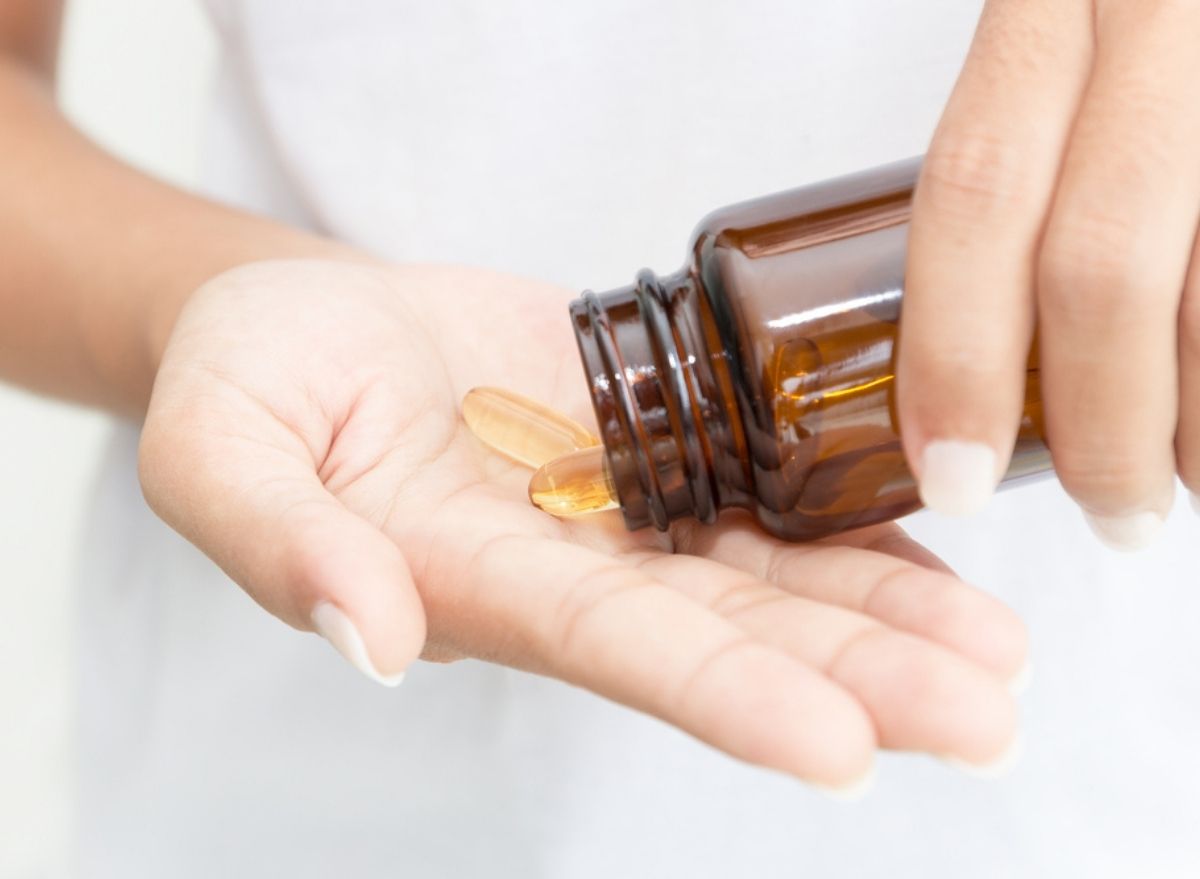If you don’t already rely on supplements, then you definitely know quite a few people who do. When it comes to those between the ages of 57 and 85 years old, a survey of more than 3,000 individuals found that around 49% were taking one or more supplements, according to Harvard Health Publishing. That’s surely not surprising when you consider the fact that dietary supplements can offer you a range of benefits, such as boosting your productivity or helping you slow down the aging process.
If that has piqued your interest, then you might be interested in what else supplements can do for you. In order to figure out just that, there are a few questions you can ask yourself about your personal goals and how a supplement might suit you. For instance, how is the supplement meant to help you? How are you supposed to ingest it? How much are you meant to take? When should you take each dose? And how long should you be taking it? On top of that, you need to figure out what problems or issues might arise if you are to use a particular supplement. To help you keep track, the Office of Dietary Supplements created a form that you can download, print, and fill out with important information about any potential supplements you consider.
To learn more about some of the most helpful supplements out there, we asked expert dietitians to share their suggestions on the supplements that you probably aren’t taking but likely should. Then, for more easy health tips, make sure to check out 7 Vegetables That Reduce Inflammation and Slow Aging.

“NAC (N-Acetylcysteine) is a powerful antioxidant supplement that has been shown to provide numerous health benefits and should be included in most people’s supplement list,” says Mary Sabat, MS, RDN, LD. “It is particularly beneficial for people with liver and lung disorders, as it helps to reduce inflammation and improve the body’s detoxification processes.”
“In addition, NAC may be beneficial for supporting cardiovascular health, helping to improve cognitive function, and even reducing the symptoms associated with some mental health conditions,” Sabat says, while adding that it “has been used in both fighting COVID and long COVID symptoms.”
A review published in Cell Journal also deemed NAC “a powerful antioxidant” that can help with a wide range of conditions, while noting that it “is a safe and well-tolerated supplementary drug without any considerable side effects.”
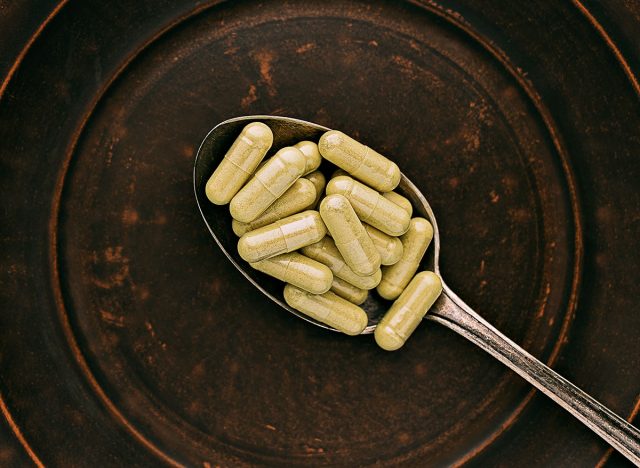
“Quercetin is another great antioxidant that is often overlooked in someone’s supplement arsenal,” Sabat says. “It is best known for being a zinc ionophore, which means it helps get zinc into the cell.”
“Quercetin is a flavonoid that is found naturally in many fruits and vegetables,” Sabat explains. “It has a variety of potential health benefits, such as reducing inflammation, boosting the immune system, and protecting against oxidative damage. It may also be beneficial in treating certain conditions, such as hay fever, prostate cancer, and diabetes. Additionally, it is thought to help reduce the risk of heart disease and cancer.”
Research that was published by Nutrients backs this up, finding that quercetin “has a wide range of biological actions including anti-carcinogenic, anti-inflammatory, and antiviral activities.”
When it comes to taking quercetin supplements, the Icahn School of Medicine at Mount Sinai says that they can be ingested as pills, capsules, or in a form that can be added to water before drinking, which certainly makes things easy.
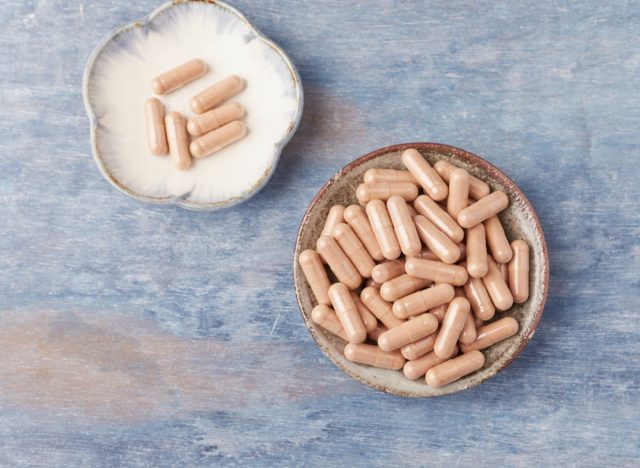
“Cat’s claw is an herbal supplement derived from the Uncaria tomentosa, an evergreen vine native to the Amazon rainforest,” Sabat says. “It is known for its anti-inflammatory, antioxidant, and immune-boosting properties.”
“It is believed to help with a variety of ailments, including arthritis, digestive issues, and even cancer,” Sabat says. But that’s not all it can do. “Cat’s claw may also help to reduce inflammation in the body, and some studies suggest that it may be beneficial in boosting the immune system and fighting infections.”
While you might be interested in the benefits of cat’s claw and may want to add it to the supplements that you regularly take, just be sure that is what you actually pick up. You don’t want to accidentally take cat’s foot or devil’s claw, which are not the same thing as cat’s claw.
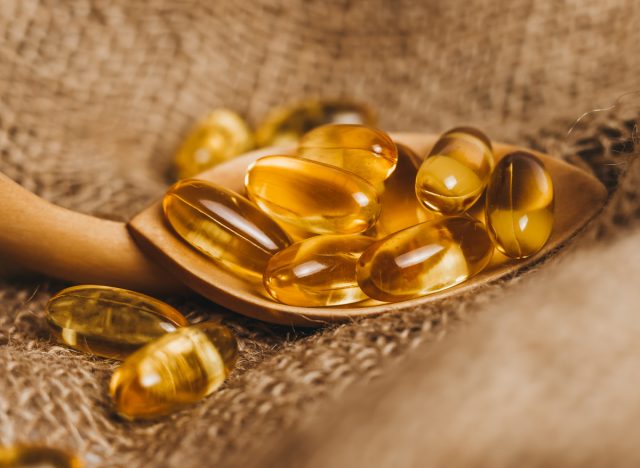
“A powerful supplement that nearly anyone should consider is Omega-3 fatty acids,” says Erin DeMille, MS, RD. “One of them in particular, EPA (or eicosapentaenoic acid), has been found to have powerful effects on cognition, mood, inflammation, immunity, and heart health. “
“These anti-inflammatory fats must be consumed through the diet because our body can’t make them on its own, which is why they are named ‘essential fatty acids,'” DeMille explains. She also notes that “most people are not getting nearly enough Omega-3’s in their diet alone, so this is one nutrient that can be helpful to supplement.”
There are various types of omega-3 supplements, such as fish oil, fish liver oil, krill oil, algal oils, and flaxseed, according to the National Institutes of Health, so be sure to consider which is best for you.
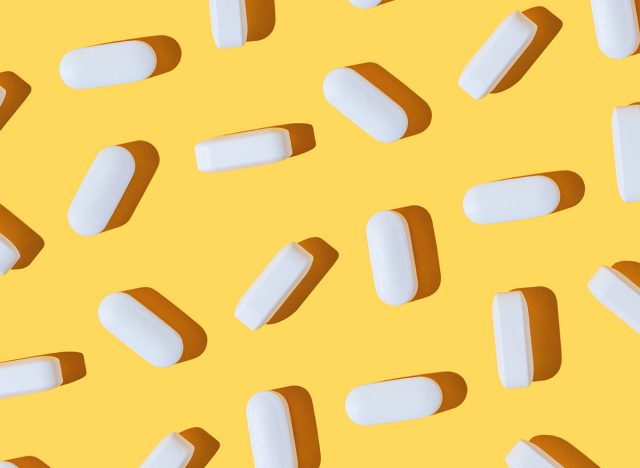
DeMille also recommends magnesium, saying that “it’s essential for digestive processes, protein formation for genetic expression, muscle movement, DNA repair, nervous system regulation, and so much more.”
“It has also been found to be helpful with stress, recovery, and sleep,” she says. “A great supplement containing a good magnesium formulation is very beneficial for many people. I love magnesium glycinate for sleep or magnesium citrate for helping regularize bowel movements. Either way, the body gets the benefit from the magnesium and the different formulations have some additional benefits, depending on someone’s needs.”
Unfortunately, DeMille points out that “in most standard American diets, people aren’t getting enough magnesium through food alone.” On the other hand, you don’t want to overdo it with magnesium supplements, as getting too much can lead to nausea, abdominal cramping, and diarrhea, according to the Mayo Clinic.
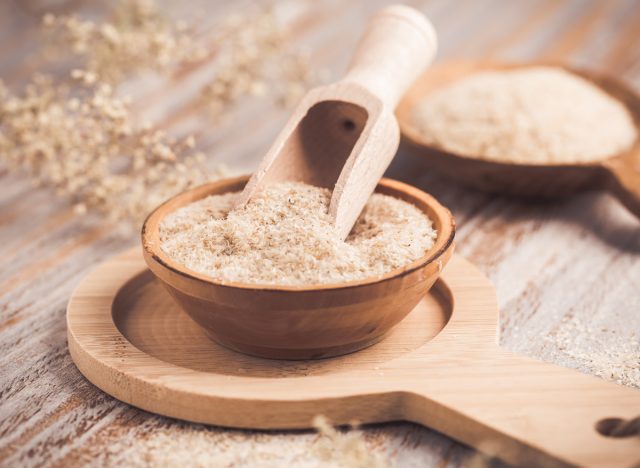
When it comes to psyllium husk, DeMille says “it’s not delicious, but it’s a powerful supplement!” You may be aware of that fact if you’ve ever taken Metamucil, Fiberall, Cilium, or other laxatives, which use this supplement as the primary ingredient.
However, beyond that, DeMille explains that it “has been found to reduce cholesterol, improve digestion, reduce the risk for many diseases, including heart disease and colon cancers, and help regulate blood sugar.”
“It’s a supplement that really covers a lot of concerns in one effective, daily dose,” DeMille says. “It’s a supplement that should be started early and kept in the routine. I recommend it for many of my clients, of all ages!”
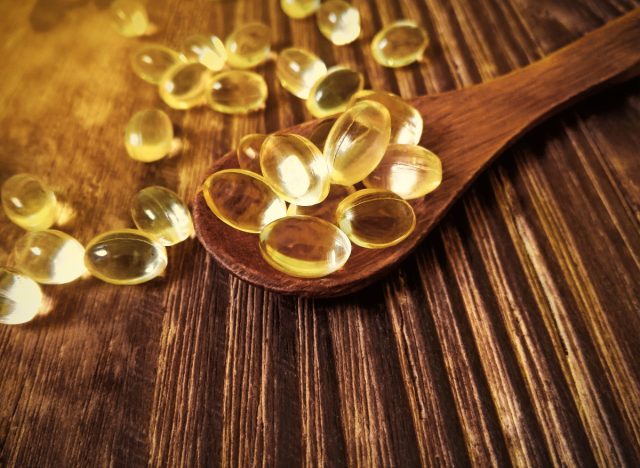
“Vitamin D is crucial for bone health, immune function, and other bodily functions,” says Johna Burdeos, RD. Although it’s surely a vitamin that you know well, there’s also a very good chance that you’re not getting enough in your diet.
“Several groups of people are at risk for low vitamin D levels,” Burdeos says. “These groups include home-bound individuals, older adults, people who don’t get much sun exposure year round or cover up completely outdoors, people with darker skin, people living in larger-sized bodies, as well as those who’ve undergone bariatric surgery. “
In fact, about 35% of American adults have a vitamin D deficiency, while the same can be said for around 1 billion people around the world.
“It should be noted that vitamin D is naturally occurring in only a few foods like fatty fish (salmon, tuna, sardines), beef liver, and egg yolks,” Burdeos adds, which explains why you may not be getting enough through your diet alone. Although she does point out that “it is fortified in some foods such as milk, yogurt, soy milk, orange juice, and cereal,” she says that “if you don’t eat any of those vitamin D-rich foods, you’re at risk of deficiency and could benefit from a supplement.”
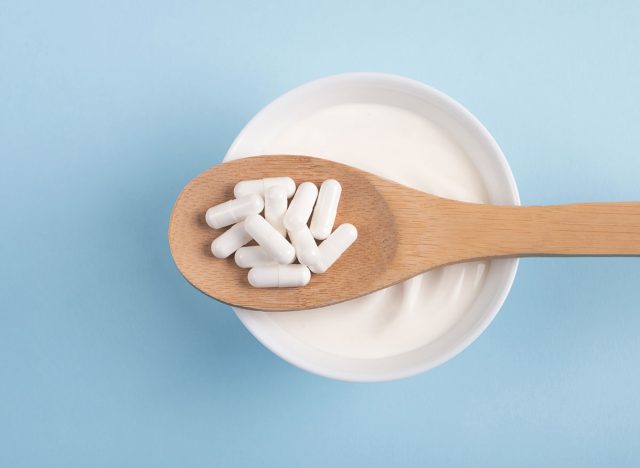
If you’ve been thinking about trying a probiotic, Burdeos explains why you might want to take the leap, saying, “More and more evidence suggests that probiotics are linked to potential health benefits, including improved digestion, immune system support, and reduced inflammation.”
“Probiotic-rich foods include fermented products like yogurt, kefir, sauerkraut, kombucha, kimchi, miso, and pickles,” she says. “If you feel as though your body could use more probiotics but you don’t like these kinds of foods, it’s worth discussing with your medical provider to see if probiotics would be right for you.”
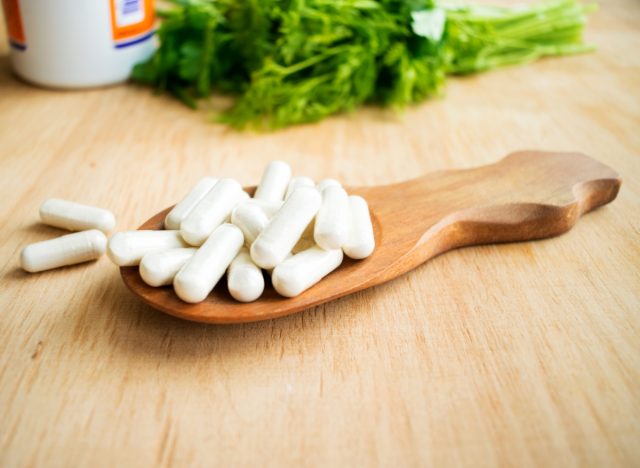
“There are two key forms of vitamin K that are important for health: vitamin K1 and vitamin K2,” says Megan Wong, RD, at AlgaeCal. “Both help with blood clotting, but vitamin K2 (especially the MK-7 form) also keeps your bones and heart healthy.”
“You can think of vitamin K2 MK-7 as a traffic controller for calcium—it directs calcium to your bones and keeps it from settling in unwanted places like your arteries,” Wong explains. “This is why vitamin K2 is linked to a lower risk of heart disease as well as prevention of osteoporosis and fractures.”
“It’s hard to get enough vitamin K2 MK-7 through diet alone, as it’s mainly found in cheese and fermented soy foods, which is why a supplement is recommended,” Wong says. Whether you’re eating an arguably healthy diet or one that’s not exactly ideal, vitamin K2 doesn’t tend to show up often in food found in the Western diet, which is why you may need a supplement.
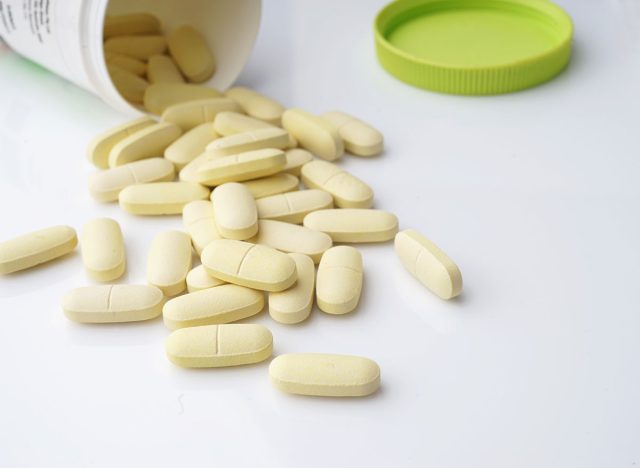
You might think that calcium is something you only need to take when you get older. However, you should actually start taking calcium in your late 20s. “Most adults aren’t thinking about ways to prevent osteoporosis until they’re in their 40s or 50s,” Wong says. “But peak bone mass, which is when your bone density will be at its highest, is reached at age 25-30.”
“The higher your peak bone mass, the better position your bones are in when you get older,” says Wong. “So I recommend young women (since menopause takes a huge toll on bone health) start taking calcium supplements before it’s too late.”
If you decide to take calcium supplements, American Bone Health points out that you should be sure to do so while you’re eating, but not at the same time that you take iron, as they happen to be two supplements that you should never take together.
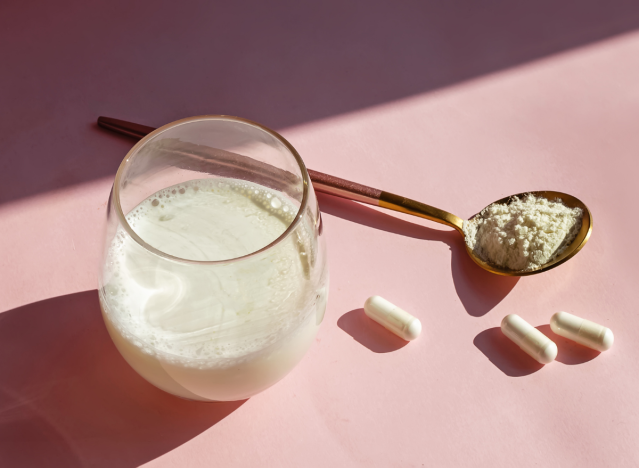
Molly Snyder, RDN, LDN, tells Eat This, Not That!, “Collagen supports many elements of a healthy body, such as healthy skin and elasticity, bones, joints, and muscle mass, and stimulates metabolism and healthy weight management.”
“Your body does produce collagen, but this production decreases with age,” Snyder says. “To me, collagen is key to prevent breaking, whether that’s skin, hair, nails, or bones. It’s an essential preventative measure.”
As for how to take a collagen supplement, Snyder says it “can be mixed into oatmeal, yogurt, smoothies, or any beverage of choice.”
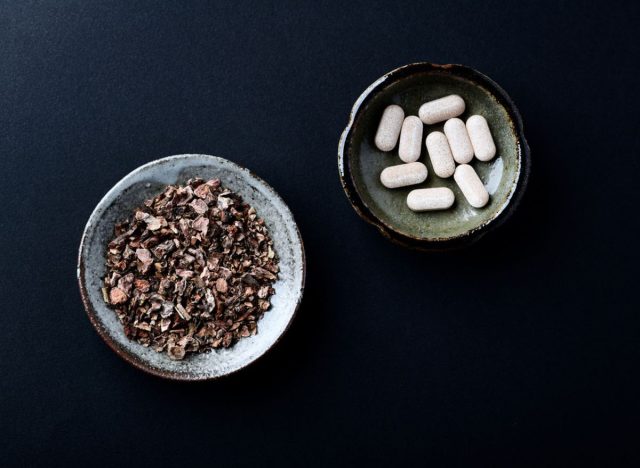
What is Rhodiola? Snyder explains that it “is an adaptogenic herb known to help your body adapt to the stress of daily life,” which is certainly something that plenty of people could use.
“In general, adaptogens help the body resist stressors and maintain overall balance in the central nervous system,” says Snyder. “The central nervous system is connected to almost every part of your body and your life, and your nervous system is essentially tied to gut health and digestion. You can carry pain in your muscles that causes cramping, you could be mentally stressed and have stress present as anxiety and affect your cortisol levels, which could in turn affect weight gain. Rhodiola’s powerful effects are known for its stimulating and energizing effect.”
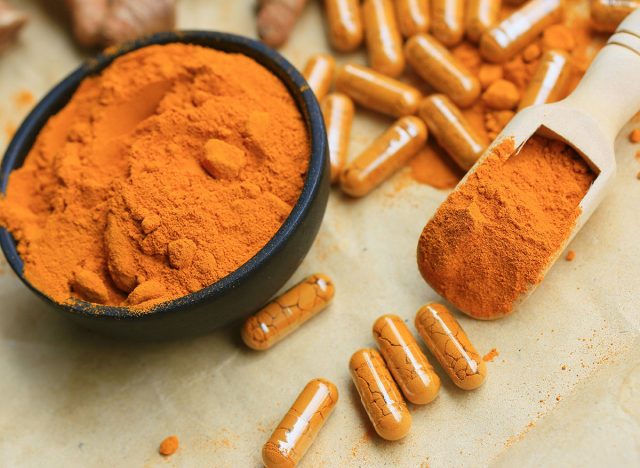
Tumeric may be an ingredient that makes your meals tasty. However, it’s also been used for health-related reasons for around 4,000 years, according to the Icahn School of Medicine at Mount Sinai. These days, it can be taken as an extract, a tincture, or a capsule with powder.
As for what it can do for you, Snyder explains that “Turmeric has powerful anti-inflammatory and antioxidant properties that support healthy brain, cardiovascular health, and cancer prevention.”
“One main reason I love incorporating turmeric or supplementing with turmeric is that it has been shown to increase the growth of new neurons and may help fight various degenerative processes in your brain,” Snyder says. “Turmeric supports a healthy heart and may lower your risk of heart disease. With turmeric, a little goes a long way.”
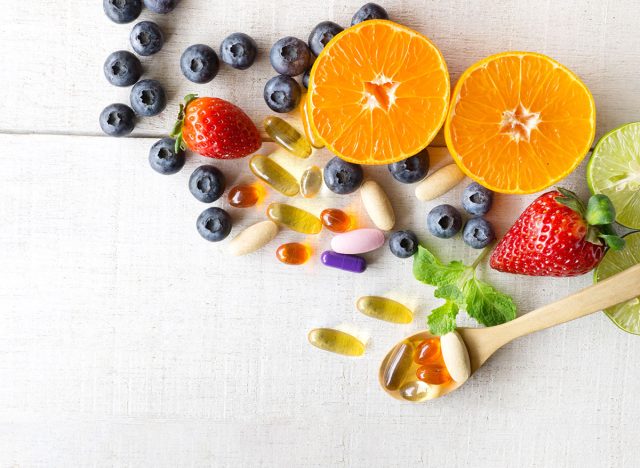
You surely know how important it is to eat your fruits and vegetables. Beyond that, it’s key to eat a range of fruits and veggies in order to get the variety of nutrients your body truly needs, according to the Harvard T.H. Chan School of Public Health. However, some people never seem to develop a taste for bananas, carrots, or broccoli. If that sounds like you, you might want to consider supplements that take the place of a nutrient-filled salad.
“Supplements in this category provide a wide range of vitamins, minerals, antioxidants, and other essential nutrients,” says Melissa Rifkin, MS, RD, CDN, nutrition expert for Juice Plus+. “The convenience of all of these nutrients packed into a capsule or chewable make it easy to incorporate into your daily routine. Especially for those who do not eat the recommended 1.5-2 servings of fruits and 2-3 servings of veggies per day, a supplement can ensure adequate nutrient intake and help reduce the risk of deficiencies.”
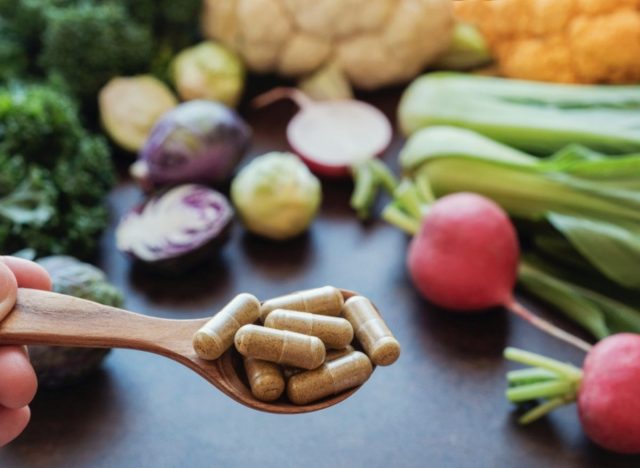
“Lastly, I recommend people take a daily fiber supplement,” says Jesse Feder, CPT, RD, contributor at My Crohns and Colitis Team. Although “a lot of people do not meet the daily recommended fiber intake through their diets,” Feder points out that “Fiber is very important for normal bowel movements and gut health.”
Additionally, taking fiber supplements may reduce the risk of both type 2 diabetes and heart disease. It might also help with weight management, thanks to the fact that fiber is a low-calorie option that also makes you feel full faster, as well as helping you to feel nicely satisfied, which is an undeniable bonus, wouldn’t you say?
